The borderlands of the southwestern United States are not the only place where immigration enforcement tramples upon the most basic of civil and human rights. Many communities along the northern border are also subject to such abuses, as detailed in a recent report from OneAmerica and the University of Washington Center for Human Rights. The report, entitled The Growing Human Rights Crisis Along Washington’s Northern Border, is based on a year’s worth of interviews and observations in border communities in Washington State. This investigation found that Border Patrol agents, often acting in collaboration with local police, repeatedly harass and abuse immigrants, as well as native-born U.S. citizens perceived to look or sound like immigrants.
Specifically, the report documents three “patterns of abuse”:
1. Racial profiling by the Border Patrol.
“My son called me to tell me that he had been pulled over without his license. I told him that it was alright that I would drive out to meet them with his license. When I arrived there were Border Patrol cars surrounding the area. I had to drive back to the house for my kids’ birth certificates because the Border Patrol officers were accusing them of being ‘wetbacks’ despite my kids telling the agents in English that they were American citizens. When I finally got to my kids I went up to the officers and said, ‘You know what, my kids are American. If they weren’t they wouldn’t have said they were. This thing that you are doing here is called racism; just because you see that my kids are brown [Latino].’ The officer replied, ‘Sorry, but this is my job.’ And I said, ‘Ok, but there was no reason for seven Border Patrol cars to come deal with my kids, with two minors. You are treating them as if they were criminals’” (p. 19).
2. Collaboration between the Border Patrol and other law-enforcement agencies.
“The kids were outside running around and playing, and a little girl had an accident and fell between two cars in the driveway. The mother was worried her daughter wasn’t ok and called 911, asking for an ambulance. The mother spoke English but gave her last name, which was Martinez. Shortly afterwards the ambulance, firemen, Sheriff, and Border Patrol arrived. The Border Patrol began to walk around the outside of the party asking people who they were and their names. The family members were U.S. Citizens, but many of their guests ran inside the home and closed the door. Now whenever those people have an accident they will be fearful to call 911 because the men in green will show up. They see police and Border Patrol as the same—as dangerous for our families” (p. 22).
3. The climate of fear created by these practices.
“A 22 year-old friend of mine lives with her husband at her parent-in-law’s house. Every time he beats her and she attempts to call the police the parents-in-law threaten to call immigration on her or tell the officers her immigration status…The domestic violence has gotten worse as time goes by. In fact, now she can’t even talk over the phone because her husband and parents-in-law have the poor girl on lock-down. She is too young to live her life in fear whether she is documented or not” (p. 25).
The report calls for a wide range of administrative and legislative fixes—at the federal, state, and local levels—in order to remedy such injustices. These include policies stating that:
- The Border Patrol should restrict “enforcement at sensitive locations, including schools, hospitals, places of worship, public religious ceremonies, public demonstrations, and courthouses.”
- Border Patrol agents “will not engage in enforcement during assistance with emergency checkpoints, health epidemics, or natural disasters.”
- Border Patrol agents “should not arbitrarily stop, question or arrest individuals without reasonable suspicion or probable cause that the individual has entered the United States illegally.”
- “State and local police should refrain from asking immigration status.”
- “State and local police should refrain from enforcing federal immigration laws, including by engaging in interior enforcement operations with Border Patrol agents and requesting translation assistance from Border Patrol.”
The report observes that Border Patrol abuses in Washington State are occurring within the broader context of a post-9/11, nationwide buildup of immigration and border enforcement resources and personnel. Ostensibly, the build up in Washington State is necessary in order to secure the porous border with Canada and keep the country safe from another terrorist attack. But, a decade after the buildup began, “communities of color in Washington State find themselves fearful of the very agencies that are entrusted with their protection,” thanks in large part to the practices of the U.S. Border Patrol.
Photo by PMC First Pix
FILED UNDER: border patrol, undocumented immigration


